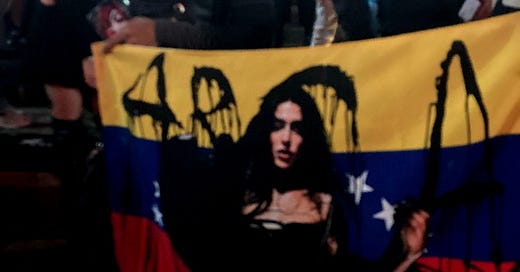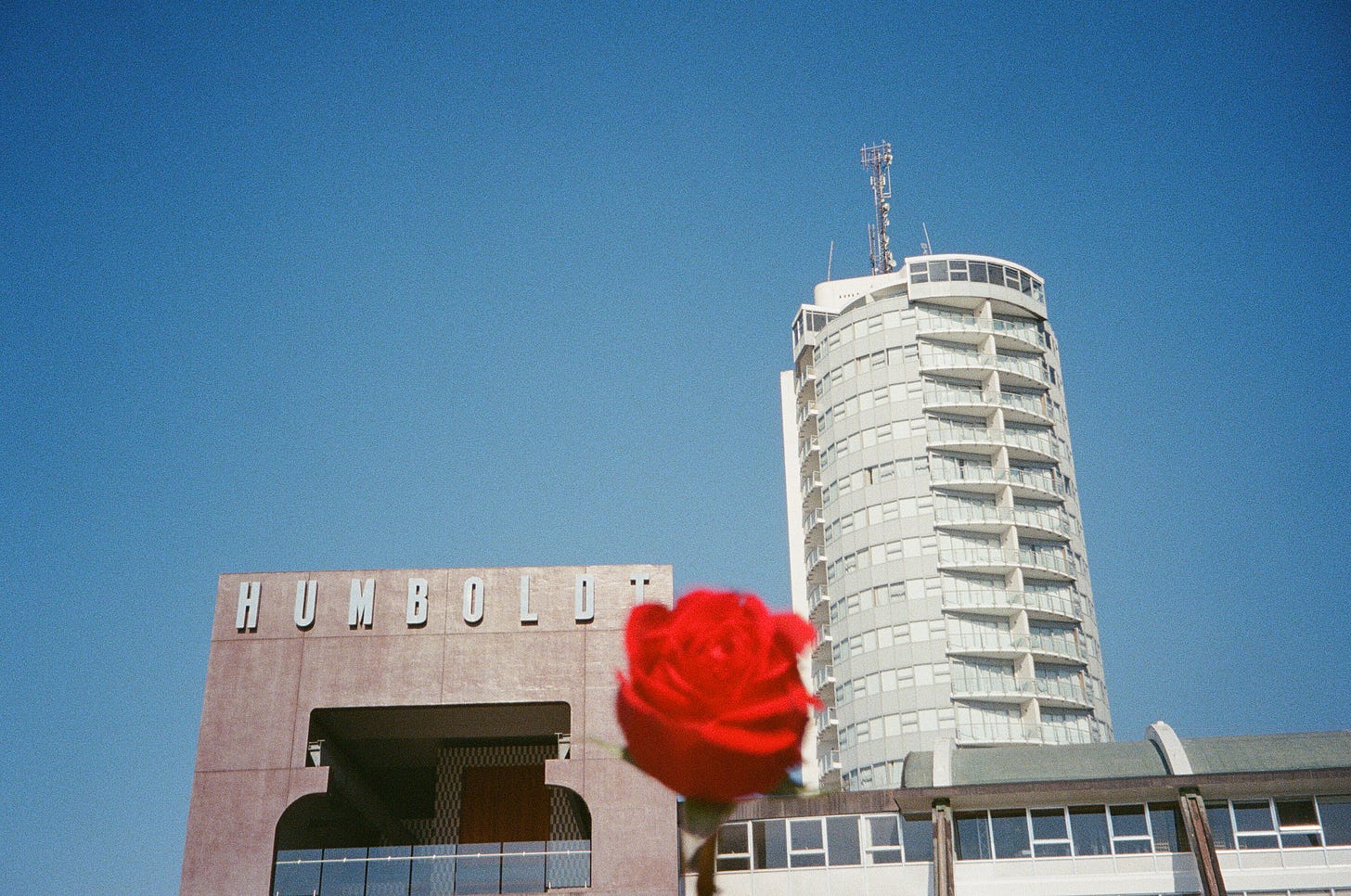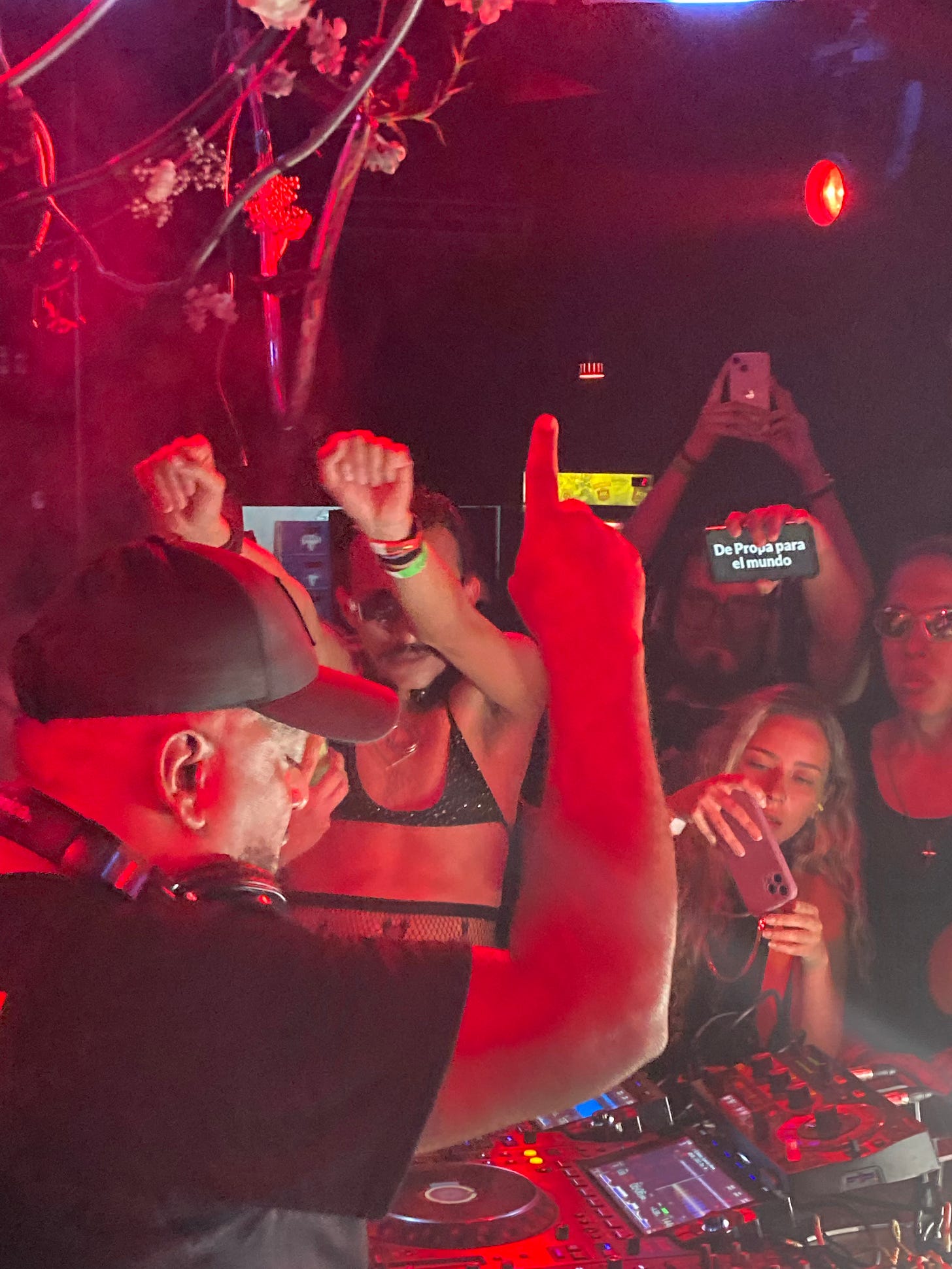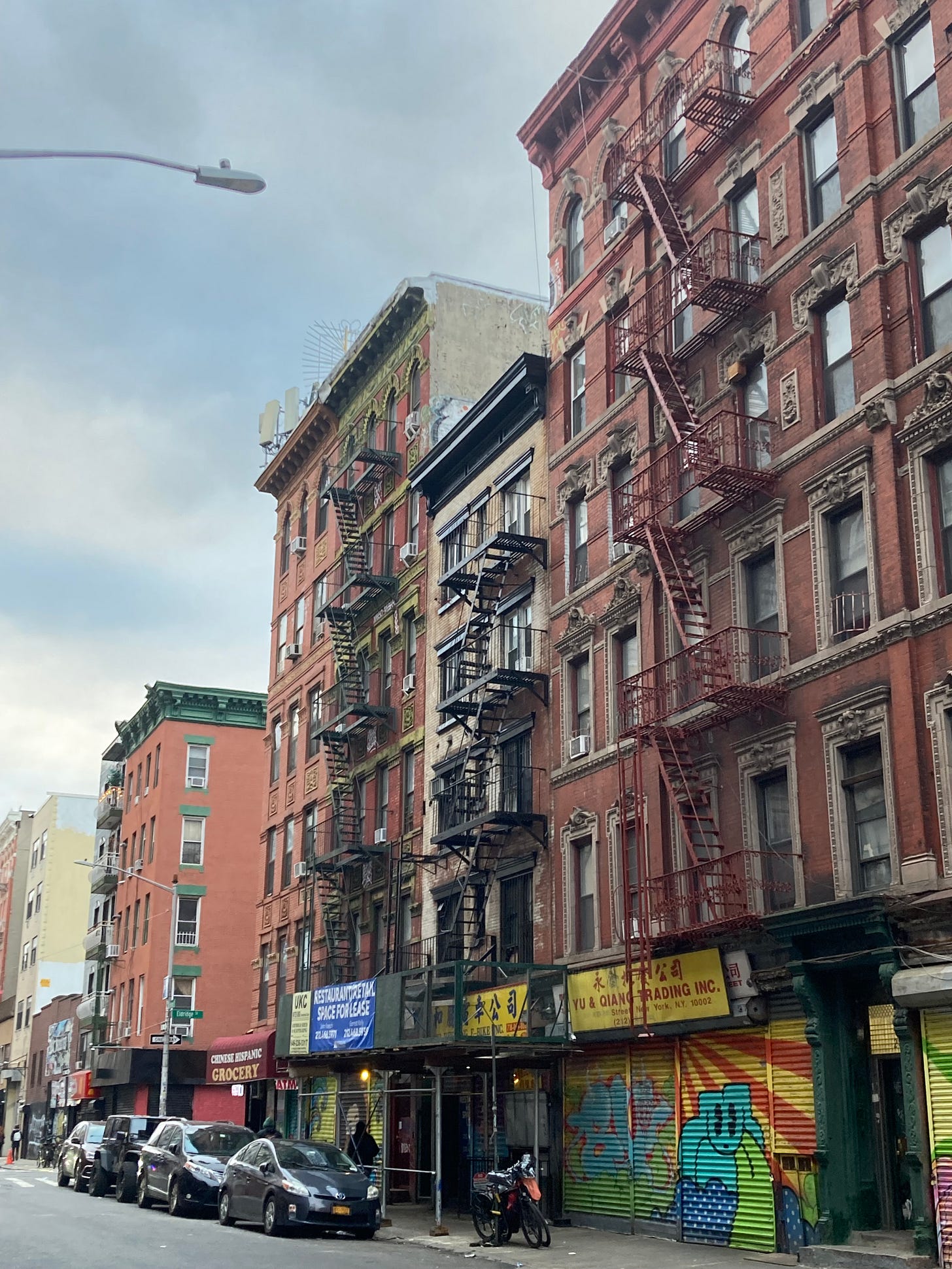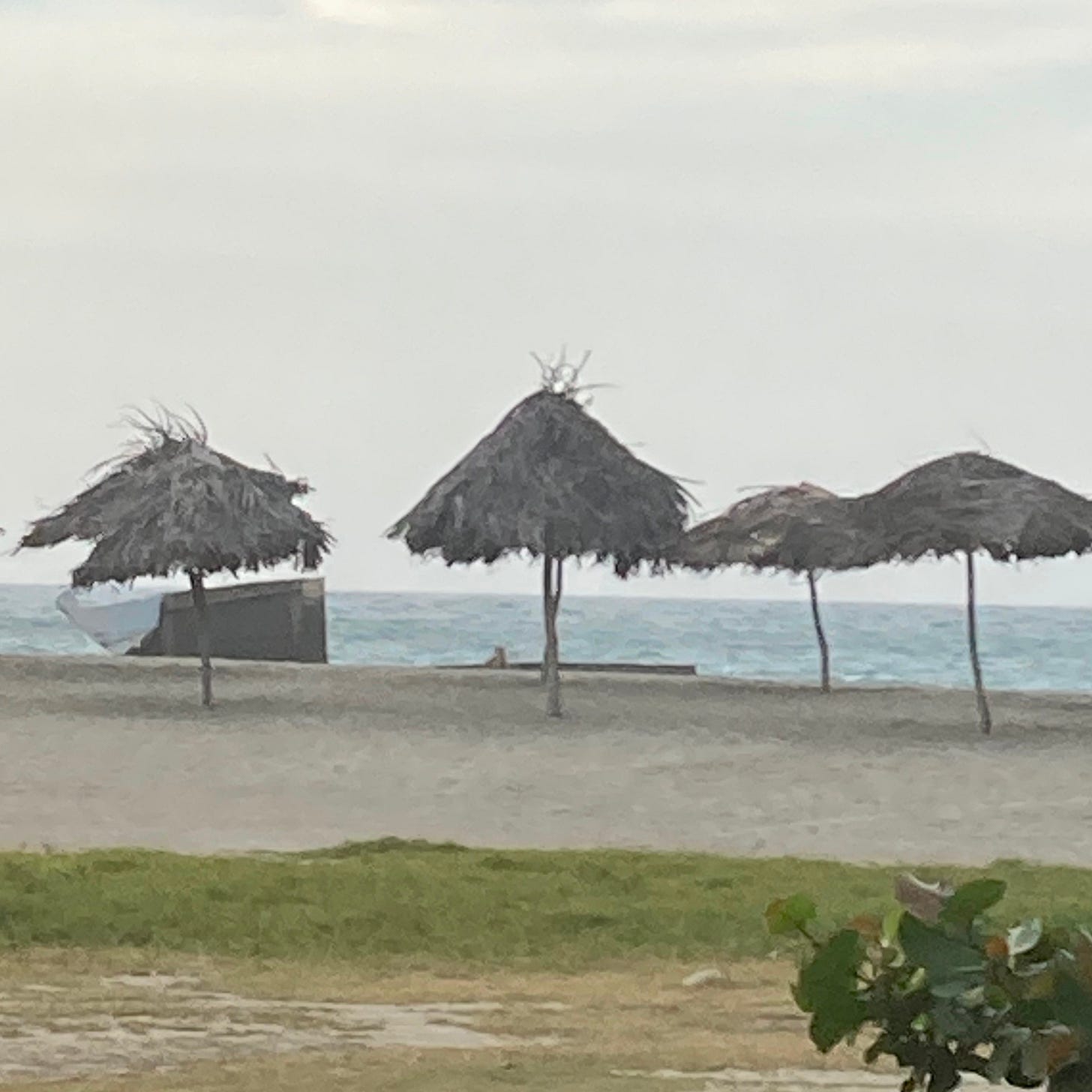LYRIC 002: The Ancestral DDJ (Pt. 2 - Caracas)
A two-part essay on Arca, channeling ancestors through dance, and starting over.
I burned a rose on top of the Ávila outside the Hotel Humboldt after my grandmother visited me in a dream. She asked her ashes be spread on the mountain. I remember how we would dance in the living room together. The last time I saw her, I asked to be left alone to dance in front of her. The song was “Yo No Lloro Más” by Celia Cruz. The funeral was open casket.
Including that ceremony, my week in Caracas was spent reconnecting with family and bringing offerings to my dead: red carnations, white daisies, cuttings of the riquí-riquí that had grown in the Quinta Nefrán’s garden for decades. I learned the logistics of death, that it is an honor to be the one to go about the task.
Twice, I showed up with bouquets to unmarked plots. In between calming down family on Whatsapp, I put on a brave face in front of cemetery clerks and learned how to replace stolen headstones. It’s a common enough occurrence that it can be checked off on official paperwork. I kept it cool.
I did still cry, though. I cried walking Sabana Grande’s hot boulevard. I cried in front of the house where a version of me was an infant, then a small child. I cried at the site of Jesús Rafael Soto’s Esfera Caracas, bright on the highway. I cried comforting my cousin, who was preparing to sell a house that had been in our family for generations, one of my last physical ties to Venezuela. I cried in the little park near the house where my father was a child, on the rusty swing. I cried accepting the feeling of unknowing in a place where I was born, the knowledge of being of a place and yet not from it despite feeling in my bones I knew its heat.
After all of that, who wouldn’t need a rager?
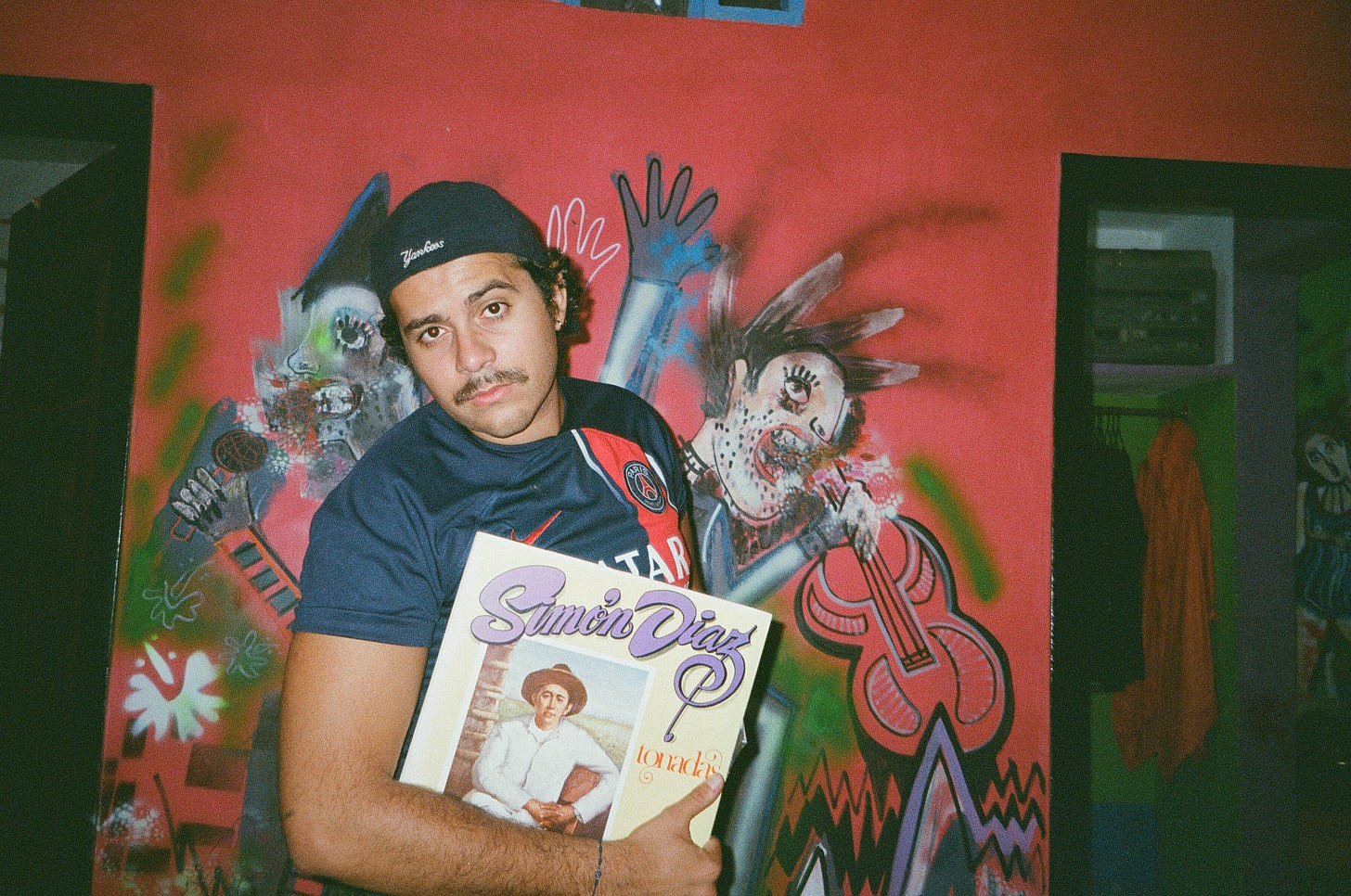
Arca was hyper-present for me that week. Driving up and down Francisco Fajardo on various personal missions, her image surveyed the highway from a black banner hanging from the streetlamps. The details were in small script, below an ethereal Arca in front of her logo: 16 MARZO 2024, CONCHA ACÚSTICA DE BELLO MONTE.
One of my personal missions was to connect with the scene. I kind of did, through Instagram. Every Venezuelan doing anything remotely artsy has at least heard of each other. I went to Esta Jevi by myself at the Casino Caracas, slinking around and bumming cigarettes until someone came and talked to me. It turned out to be A., another Venezuelan from New York I hadn’t met in person yet, a photographer who was also in town on a mission of reconnection and covering the show. It felt nice, under that unfamiliar moon, to run into a familiar face.
A poet friend from New York who was raised in Caracas put me in touch with D. He took me to galleries and spent a day smoking and gossiping with me over cold Polars and whisky. It was decided I’d meet the rave family at the Concha Acústica de Bello Monte. Back at Quinta Nefrán, I put on my fake leather pants, black boots, and a tight black tank. I head there, and after checking in I do what I came to do, interviewing dolls and chicly dressed queers on my shitty phone as the sun set. One of those people was Y., in a flowy white dress with blood-red lines painted all over it. Later in the night, watching him sway a few people away from me, I thought about how I liked his energy.
Phran’s opening set is low-key. On the stage, the leather sex swing set-up I had seen in New York is surrounded by flowers. The night air is clean, moon hanging above us. I’d never seen so many dolls in VIP. D. and I, settled somewhere in the middle with our bitchy gold wristbands, decide to go down past the barricade. All the other journalists and photographers are buzzing. We lean on one of the big speakers, little division between us and the stage. Arca comes out dressed in white. Appropriately, she starts with a cover of Simon Diaz’s “Tonada de Luna Llena.” Caracas welcomed her home with open arms.
Arca covering “Tonada de Luna Llena” by Simon Díaz
The mutual devotion between crowd and performer was palpable. Arca went smoothly through the first part of her set, ethereal mini-dress moving in time to “Piel”, “Reverie”, “Desafio”, and “Anoche”, the low-buzzing languor of these earlier songs interspersed with “Calor” and “Time”, my favorites off the KICK cycle’s first volume. In the crowd there’s slow dancing, necks being kissed from behind. She slowly builds herself to “Machote”, swaggering about as the rest of us sway. After the slow-burning start, she purrs at the crowd: “Muñecas, ¿quieren ver otro look?”. She briefly disappears, returning scantily-clad in black leather with strips of the material whipping the air, ass out, and matching thigh-highs with a clear heel. Exactly.
Then the jolt of adrenaline: “Riquiqui”, “Mequetrefe,” “Incendio”. The synth build-up of “Prada”, and the knowledge of the sweat that the shift into “Rakata” would bring, hit especially hard. I had the great privilege of seeing that transition live now more than once. Dancing to it in Caracas under that moon in that specific crowd —nobody worried or on edge, everyone feeling some version of a moment of release— was a moment beyond music.
Arca’s homecoming proved a bridge between experimentalism and tradition, between honoring one’s roots and bringing back gold to the motherland. And what gold: a GRAMMY nomination, years of experience rising up from the underground, a transformation into the world’s mother, coming back at last to feed the mutants of Caracas. The crowd was eating it up: madre, madre, madre. “I’ve always wanted to be a mother. For you to call me that is therapy,” she tenderly admits.
The space she made that night is something I still think about, that a year later my friends in Caracas (and those of us who left, whether we were there or not) say wouldn’t be possible now, as far as logistics and politics and homophobia are concerned. Venezuela isn’t a particularly welcoming country if you’re openly queer. That night though, Arca played the cuatro in a leather BDSM moment and then followed it up with a twenty-minute set on her decks, a formless moment of chaotic, contemplative sonic creation like the ones that made her name. Trans experimentalism crashing straight into Venezuelan folk tradition, what she has always been, one of the reasons we love her so much.
That evening, directed by the fab Giulia Jiménez Tani
Arca seemingly ended with “KLK”. She then remembered where she was and did “Tiro,” shouting out every state in Venezuela. I’m glad for it; I don’t know that Rosalía was the right choice to wrap up a performance that carried this much historic weight (though, yes, I was bumping it hard when it came out — sue me). She left, blowing kisses, the first (and hopefully not the last) doll to play the Concha Acústica de Bello Monte.
The show ends, and I follow D. and the family to a car after haggling for bootleg merch. We head to McDonald’s and then a bougie house, I think in Los Palos Grandes. Everyone loads up on powders and cigarettes, which I chain smoke while frenetically uploading all the content on my phone to D.’s computer. In the background, a round of Smash Bros is underway. After getting my eye makeup done, we head back to the car toward Los Ruices.
We’re blasting Cardopusher and Bloody Mary’s collab on the drive, going fucking hard. Everyone is laughing. I’m looking out the window, still in awe of the moment. When we arrive at Revo, the line is out the door. We step out into the night.
Outside the Park Avenue Armory, I lock eyes with Carlos, sweet Gio, and Andrés, absolutely dapper in a formal all-black outfit. He was at a funeral earlier that day and had come to take his mind off things. Out of the corner of my eye: two cunty editors I’ve emailed with, faces obscured by dark sunglasses. Slant texts me, but my phone dies before I can reply. The rose I don’t throw at Arca I give to Isabelia. Over the next few days, my Instagram story is a portal to all the cool Venezuelans and dolls in the city going to channel with our high priestess: Veró, Cassandra, Kay, Maia.
The rest of the week, I said my farewells to the city. I walked 5th Avenue crying, and the length of the Bowery. I sweated for hours with a new lover in two different hotels. I launched a humble book of poems, my first. I held and was held by my friends, grieving the ongoing bombardment of Gaza. At my favorite punk bar under the JMZ, I got too drunk with two friends known for benders (if you’re reading this, never change). Of course, this is the night the DJ decides to play Daddy Yankee.
I was bound for Mexico City, with a November appointment at the Venezuelan embassy. A hacker was paid (thankfully not a lot) to get my SAIME account to work. This is perfectly normal.
The last thing I wanted to do before leaving New York was go uptown. It was a cloudy day, and early. I arrived at the Hispanic Society. Face-to-Face with the yellow Penetrable by Jesús Rafael Soto, I walked right in, let the wind and my body give the sculpture a gentle shake as I twirled. On my phone, I let “No Queda Nada” play, remembering the end of the residency’s perfect first night.
An issue at the door. Nothing I’m not used to. Eventually, after texting the right people and saying the right things, they let us into the thick sweat of it. We had arrived in time for Arca’s set. I was sad to learn later that I missed Cardopusher and Mpeach, though I’ve been grateful to shake ass to their tambór and dark electronic sets in New York and Mexico.
There wasn’t so much dancing as there were phones out, stillness. It bothered me, though I don’t blame everyone — mother was giving diva experimental, which meant the only constant was the unpredictable. Breakbeat and Arabic pop and high-pitched vocals and the low toll of a church bell mixed with sirens and dembow and Frank Ocean. If the performance at the Concha Acústica was for us, this was definitely for her — but of course it’s a privilege to be in the proverbial laboratory with this particular mad scientist.
I think we were also in a kind of shock, a moment of true prayer and meditation at the club. We didn’t know whether to catch a beat or really take in the moment, air thick with Venezuelan nightlife history. It was also fucking hot. With the circular shape of the venue, it really did feel like a boiler room building pressure. The high point for me was about halfway, when she spun La Factoria’s “No Voy a Llorar”, a voice breaking through the electronic fog of the improvisation. The up and down continued, pressure cooker finally exploding as she ends on a pitched-up break edit of Beyoncé’s “Ring the Alarm” and DJ Babatr was invited up to the decks.
Arca mid-set at Revo
At that point, I had surfed the sea of ravers to the front. DJ Babatr opens with hard electronic drums and an invocation: I heard the name of “Obatala”, the orisha of creation. It wouldn’t surprise me —I knew Baba was tapped in like that.
I stayed dancing next to the booth for a long time, moving hard to raptor house beats. He had told me a long time ago that the genre he was the progenitor of (one of many that rose up at the same time in Propatria and Petare, the slums on the outskirts of Caracas) was a bastard child of Eurohouse. I could see that so clearly, in that lightning-quick BPM, in that drum n’ bass worthy of a warehouse in Berlin. Imagine that energy, swirling and slamming against the walls of a much smaller space.
Behind Baba, tuki dancers were breaking it the fuck down on the floor in a way I’d never seen before. After capturing what I needed to capture, I allowed myself to disappear into the sound. It was a moment of really understanding what McKenzie Wark wrote about in Raving, about the thesis of the rave as a liberation (however temporary) of queer bodies. I’d noticed, recently, that my “why” for dancing is often tied to grief, to letting things be released, offering up every tension in my body to the music as I flail about in it.
DJ Babatr / De Propa para el mundo / The tuki dancers
A lot of that grieving is, for me, tied to family and place. When I move and sweat next to absolute strangers, gnash my body to hard beats under dark shades, I feel all my ancestors with me. My father’s mother and her love of dancing. My father’s father and his love of music, his extensive collection of salsa on vinyl. My mother’s father, the journalist who lives on in me, observant. My mother’s mother, her devotion to God. My body becomes a bridge between worlds in these spaces, outside of gender and money and country and time.
The need for water and a cigarette takes me away from the center, and I largely stay on the periphery for the rest of it. I make my way back to the booth for Yirvin and Phran, eager to absorb my country’s electronic history straight from the source, directly into my veins. D. and the family are behind the Boiler Room sign for most of it. When you’re running around, it’s good to know there are homies anchored down close by, people who are still more or less looking out as they relish their own moments of dancefloor transcendence.
We go until 5am, when I remember I’m there to interview the DJs. I catch Arca on time to see her put her head on her man’s shoulder, sip champagne, take a photo, and head out a secret door. The journalist in me wanted the scoop. As someone else overwhelmed to be home for the first time in years, I saw in her face the exhausted seraphic beauty of a performer satisfied with a job well done. I didn’t need the bochinche, and I don’t think she did either. I said a silent thank you as the brief light of the room she entered disappeared, the door closed, and the sound overwhelmed me once more.
How many writers have left New York? How many of them have attempted to write this essay? All of them, since Didion. I had reached a point after almost a decade of loyalty where I knew I was going to leave. The world is too big, and it's all a fair bursting with color and sound, one that we shouldn’t be too afraid to explore.
I’ve definitely stayed too long at a rave before, past enjoying the beats and past the moment of transcendence, bogged down by the physical world and sunlight after a brief and sweltering escape. Things get real. I used to have fantasies I would go down with the city, on a rooftop smoking a cigarette on a collapsing building. Instead of dying a local, I stayed long enough to watch Eric Adams become Mayor, long enough to see the Empire State Building lit up blue and white while the streets below burst full of crowds in keffiyehs yelling FREE PALESTINE.
For better or worse, I’ve realized on subsequent trips back, you can still drop me on any corner and I can make my way around as soon as I locate the subway. After nine years, some things stay in your blood.
We ran into each other outside the club. We had dragged a homophobic rookie cop who stopped us together before getting in a taxi. We had been making out at the afters. We had breakfast together. He agreed, spontaneously, to head to the beach. Aries Moon people do shit like that. I didn’t mind the company.
In the back of the car to Playa Panty, I stroked Y.’s soft head as he lay on my lap. I couldn’t go to sleep, and though my body felt it my eyes were wide awake, limbs still vibrating with the motion of the night becoming day. It was my first time awake for more than 24 hours — even after my most decadent rave moments, I made sure to never hit those points of no return. This was different.
It was important for me that nobody fuck with us. The government had only become more homophobic. Just that week, two men were kicked out of Plaza Altamira for hugging. The New York in me was careful and alert. The exhuasted raver surrendered to the sand, to the laying, the kissing between Belmonts. I would learn a year later, when we would keep talking, that you prefer Lucky Strikes.
I dipped my feet into the roiling Caribbean for the first time in a long time and let it rock my exhausted body. I swear I could hear it whisper sweetly in my ear.

